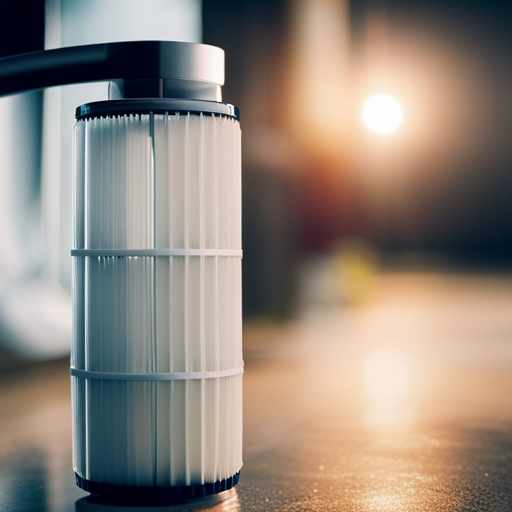Are you a Brita filter user who wants to keep your filtered water fresh and clean? If so, you may be wondering whether it’s safe to let your filter dry out. The good news is that not only is it safe, but it’s actually recommended if you won’t be using your filter for a few days or longer.
By letting your filter dry out, you can prevent harmful bacteria and organisms from breeding and keep your water tasting fresh.
In this article, we’ll explore the benefits of drying out your Brita filter and show you how to do it. We’ll also discuss how to reuse and disinfect your filter once it’s dried out.
With our tips and tricks, you’ll be able to keep your Brita filter in top shape and enjoy fresh, clean water every time you use it. So, let’s dive in and learn how to keep it fresh with a dry Brita filter.
Key Takeaways
– Drying out Brita filters is safe and recommended for maintenance and optimal performance.
– Air drying on a paper towel for a few hours after rinsing prevents contamination and extends filter lifespan.
– Pre-soaking filters in water for at least 15 minutes after extended periods of non-use can help maintain effectiveness.
– Reusing filters by running regular tap water through them to disinfect before placing back in the pitcher or water bottle can help flush out potential contaminants that may have accumulated.
Brita Filter Basics
If you’re not sure about the basics of Brita filters, it’s important to know that they use a combination of ion exchange resin, activated carbon, and particle filtration to remove contaminants from water. These filters are commonly used in households to provide clean drinking water.
However, like any other household appliance, they require maintenance to ensure they work effectively. To keep your Brita filter functioning well, it’s important to follow some maintenance tips. For example, drying out the filter is essential if it won’t be used for a few days or longer.
Different types of Brita filters have various features and applications. Some filters are designed to remove heavy metals, while others are intended to remove chlorine or sediment. Understanding the different filter types can help you choose the right one for your needs and ensure that you’re getting the best performance out of it.
Drying Out Your Filter
Detach the filter from your pitcher and rinse it with tap water. Leave it to air dry for a few hours on a paper towel to prevent bacteria growth.
Drying out your Brita filter has numerous benefits. It prevents contamination and extends the filter’s lifespan. When the filter is left unused for a few days or longer, it’s advisable to dry it out before reuse.
Air drying your filter can help prevent bacteria and other organisms from breeding, which can contaminate your drinking water. Moreover, drying out the filter can help extend its lifespan, saving you money in the long run.
By following these simple steps, you can ensure that your Brita filter continues to function optimally and provide you with clean, fresh-tasting water.
Reuse and Disinfection
To reuse your Brita filter, simply run regular tap water through it to disinfect it before placing it back into your pitcher or water bottle. This is because the filter may have been sitting for some time, and running water through it can help to flush out any potential contaminants that may have accumulated.
It’s important to note that the frequency of reuse and long term storage can affect the effectiveness of the filter, so it’s best to err on the side of caution and replace the filter every 40 gallons or every two months, whichever comes first.
If you find that your filter has been sitting for an extended period of time, it’s a good idea to pre-soak it in water for at least 15 minutes before using it. This can help to rehydrate the filter and ensure that it works properly.
Additionally, if you plan to store your filter for an extended period of time, it’s best to keep it in a cool, dry place, away from direct sunlight. This can help to prevent any potential mold or bacterial growth that could compromise the filter’s effectiveness.
By following these simple steps, you can help to ensure that your Brita filter remains effective and provides you with clean, safe drinking water for months to come.
Conclusion
So there you have it – drying out your Brita filter is not only safe, but it’s also recommended.
By allowing your filter to dry out when it’s not in use, you’re helping to prevent harmful bacteria and organisms from breeding.
It’s a simple and effective way to keep your filter fresh and working at its best.
Once you’ve dried out your filter, it’s important to know how to reuse and disinfect it properly.
By following the manufacturer’s guidelines and regularly replacing your filter, you can ensure that you’re always getting the cleanest and best-tasting water possible.
So, keep it fresh and give your Brita filter the care it deserves!
